
MENUMENU
TALK TO AN EXPERT
Special Hours: 7AM – 6PM PST
TALK TO AN EXPERT
Special Hours: 7AM – 6PM PST
A Class B RV is the smallest class of RV; however, they’re entirely self-contained, just like their bigger Class C and Class A RV siblings. This means that Class B RVs have appliances and an electrical system to power them. With the benefits of lithium-ion batteries becoming clear, more people are looking to this newer battery technology. But will lithium-ion batteries work in a Class B RV? Let’s dig in and find out!

Class B RVs are frequently referred to as “camper vans” because they are typically built on a van chassis. Since they are on the smaller side, they’re designed to sleep one or two adults and possibly a child or two. Fully self-contained and versatile, these small RVs are so compact that they can fit into a standard parking space and can maneuver easily through city streets as well as remote country roads.
The living space in a Class B RV is called the “house” or “coach.” The house usually includes a refrigerator, microwave, propane heater with an electric blower, water pump, air conditioner, television, and various AC and DC power outlets. To take a Class B RV off the grid, you’ll need either a generator, a battery system, or both to keep everything running smoothly.
Since the initial cost of lead-acid batteries is lower than lithium-ion, and the price is a critical component of RV sales, most new Class B RVs come with lead-acid batteries. However, some Class B RV manufacturers have started offering an optional upgrade to lithium-ion systems.
Lithium batteries will absolutely work in a Class B RV. In fact, as we’ll see shortly, they offer some significant benefits over lead-acid batteries for Class B RVs.
There are a few things to consider if you’re looking to upgrade your batteries to lithium-ion. The first is that lithium batteries don’t work well with the standard chargers designed for lead-acid batteries. A standard charger will work but will cause lithium batteries to charge slower and can shorten their lifespan.
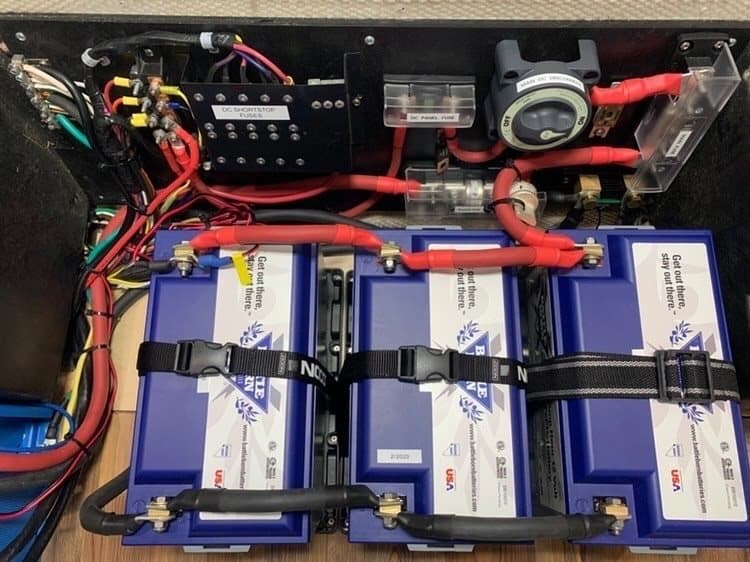
The second is that as lead-acid batteries are getting close to dying, you will usually have some warning, such as your lights dimming. Conversely, as lithium batteries are drained, they don’t warn that their charge is getting low. They just shut down. This can be an unpleasant surprise. The best solution for this is to add a battery monitor like the Victron BMV-700.
Now that we’ve established that with a proper charger and battery monitor, lithium batteries will work in your Class B RV, let’s take a look at some of the benefits of this upgrade.
One of the reasons why many RVers are interested in making the upgrade to lithium batteries for their Class B RV is that they are more energy-efficient. Draining a lead-acid battery below 50% of its capacity causes damage and shortens the battery’s life. On the other hand, lithium batteries can be repeatedly drained almost entirely without any negative impacts on the health or longevity of the battery. This means that you get nearly double the charge out of a lithium battery as you would a lead-acid battery of the same capacity.
Additionally, with the proper charger, lithium batteries also charge faster than lead-acid batteries.
Not only do you get more power out of a lithium battery, but they also weigh about half of what their lead-acid counterparts do. Weight and space are at a premium in small Class B RVs. Converting to a lithium battery system means you’ll get more power for less weight. That’s a pretty great exchange all around!
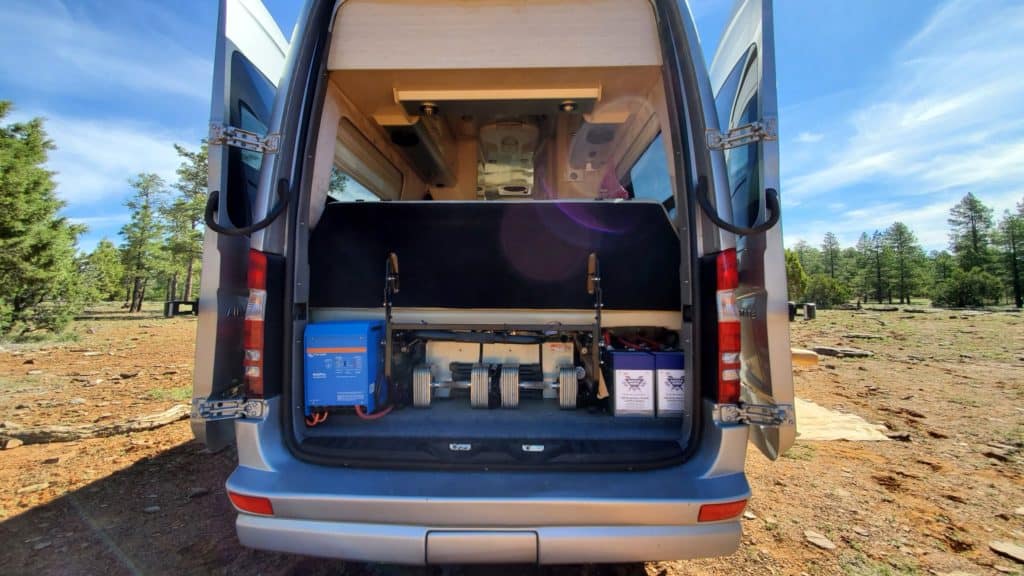
As lead-acid batteries are used, they produce toxic and flammable gases, which require them to be properly vented. Without proper venting, you are at risk of a fire or severe health impacts.
Lithium batteries don’t emit any toxic gases and don’t need to be vented. The ability for lithium batteries to be installed on the interior of a van or RV presents another benefit since small Class B RVs and vans have limited space where batteries can be installed and well vented.
Unlike lithium batteries, lead-acid batteries have cells that contain an electrolyte solution. You will need to continually make sure the battery cells have the right amount of electrolyte covering the battery plates. When the electrolyte fluid gets low, you must carefully refill it. Fluid levels also rise when a battery has a full charge, so overfilling must also be top of mind.
All batteries pose risks under certain conditions. Both lead-acid and lithium-ion batteries can explode or cause fires. However, lithium-ion batteries now have built-in battery management systems (BMS), making them safer than lead-acid batteries.
The battery management system protects a lithium battery from operating outside its safety parameters by constantly monitoring the battery’s temperature, state of charge, balancing the charge across the cells, and monitoring for internal shorts and defects. If the BMS detects an issue, it shuts the battery or specific cells down to prevent further damage or a fire.
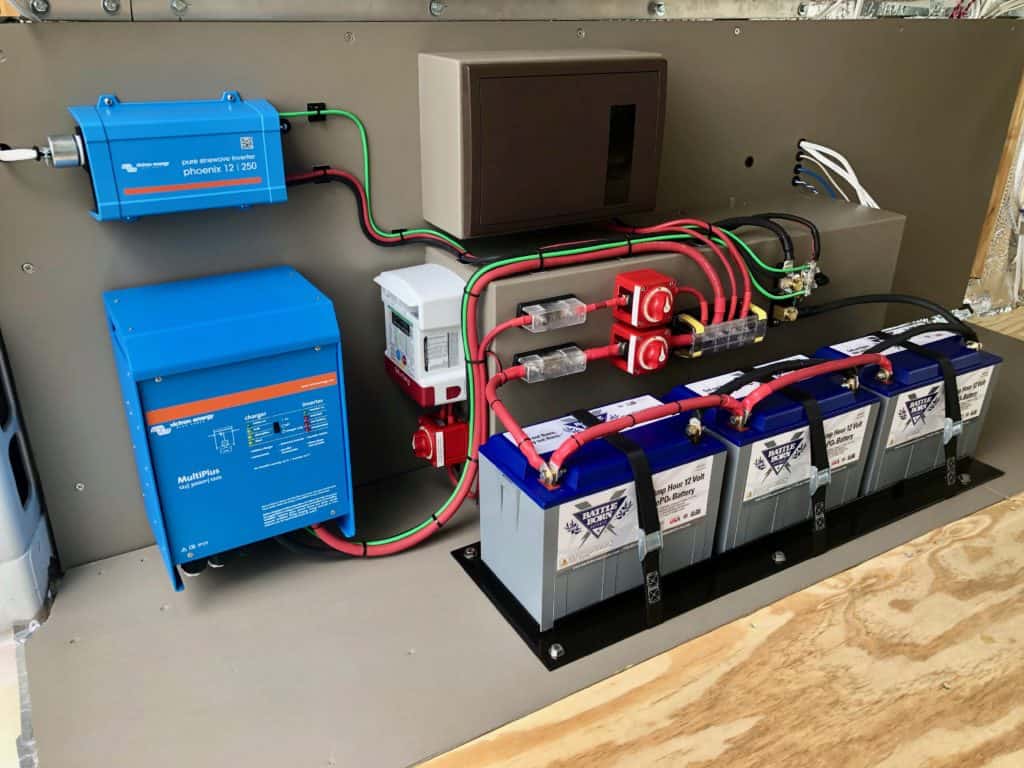
While lithium batteries cost more to purchase initially, that’s not the end of the story. Lithium batteries offer more efficiency (more power and faster charging), so you get better overall performance. This increased efficiency and power may mean you ultimately need fewer batteries in your system.
Lithium batteries typically last for 3,000-5,000 full cycles (full charges and discharges), while lead-acid batteries typically last 300-400 cycles. Lithium batteries last a lot longer than lead-acid batteries do, so you’ll replace them far less often in your Class B RV. In the long run, lithium batteries will cost you less than lead-acid batteries.
As noted above, the lifespan of a lithium battery is approximately ten times that of a lead-acid battery. Moreover, lithium batteries generally have warranties of 10 years or more, while lead-acid batteries typically have warranties of less than five years. These warranties are reflective of the longer lifespan of the lithium battery.
The answer to whether lithium batteries will work in your Class B RV is clear. Not only will they work, but they’ll offer you greater efficiency, longer lifespan, greater protection, and save you money in the long run. Not a bad argument for lithium batteries!
Shop Best Sellers

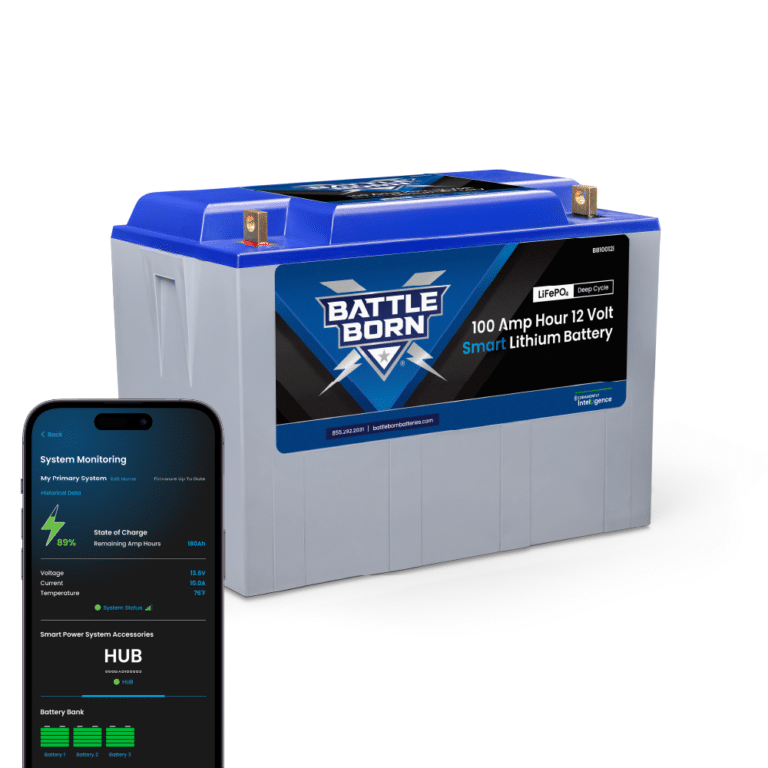

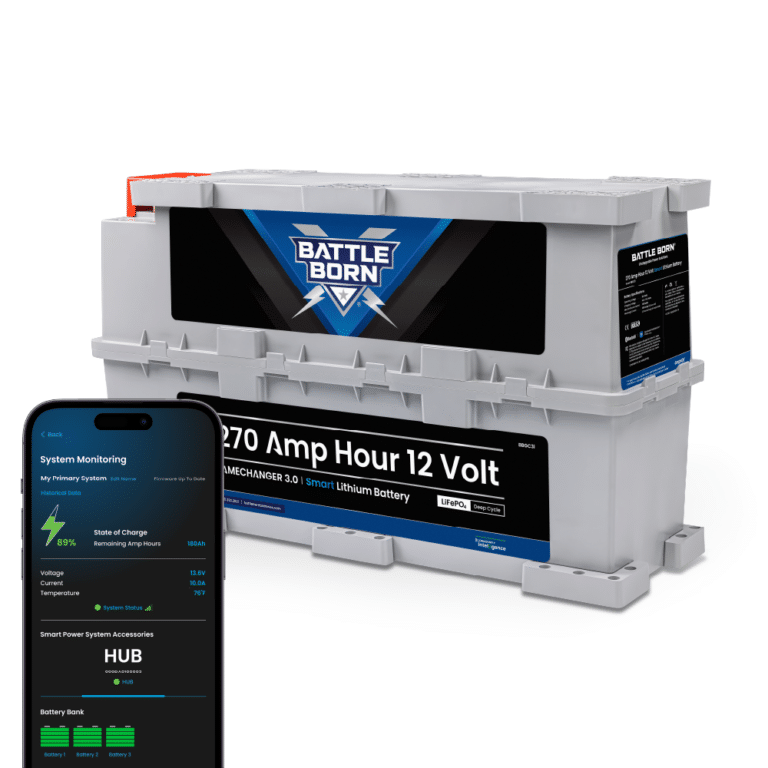




Ask a technical specialist now at 855.292.2831
Stay in the Know
6 thoughts on “Will Lithium Batteries Work In My Class B RV?”
How about agm batteries. Are they better than lead acid cell, what are the advantage over lead acid, what cost difference, what is the charging difference .
Hi Steve, thanks for reaching out. Traditional lead-acid and absorbed glass mat (AGM) batteries typically have a lifespan of between 2-5 years, depending on how well they are maintained. Although most lead-acid or AGM batteries are sealed to improve their safety, they still do not offer many safety features that lithium batteries do.
Question. I am looking at a used Class B with a lithium setup. The can is 3 years old and I am concerned there could be an issue with another part of the battery system I could get stuck with. Is there a way to definitely check the entire system? The battery is covered but not the other components. Thanks Fred S.
Hi Fred! Thanks for reaching out. Our team does not know what brand of batteries are in the Class B van, so they suggest that the best way to determine battery status is with a discharge test using a good battery monitor. You can also give our team a call at 855-292-2831 for any additional assistance. Have a great rest of your Friday!
My 2006 Pleasureway Plateau van is equiped with a Progressive Dynamics 9245-C charger. It has four stages of charge, 14.4 boost-13.6 normal-13.3 storage-14.4 equalization for 15 minutes every 21 hours. I would like to replace the Lead Acid battery with one 100 Ah lithium battery. HOW WILL MY CHARGER WORK WITH LITHIUM? WILL I NEED A DC TO DC CHARGER BETWEEN THE COACH ALTERNATOR AND THE HOUSE BATTERY SET UP?
Hi Garry. We do recommend that you get a DC to DC charger to properly charge the house battery from your alternator. If your Progressive Dynamics charger has an output voltage of 14.6 then it will be able to charge our batteries, but if not we will need to replace it with Progressive Dynamics 9160 ALV.